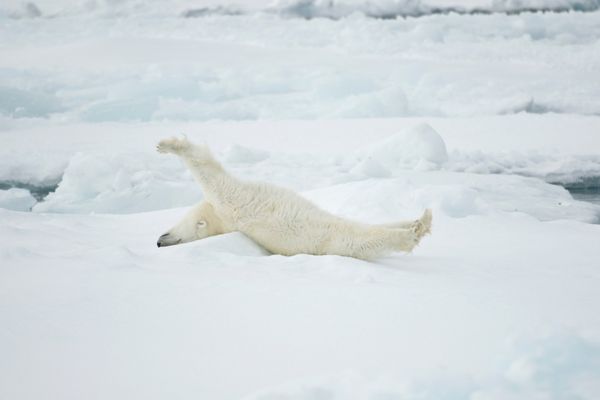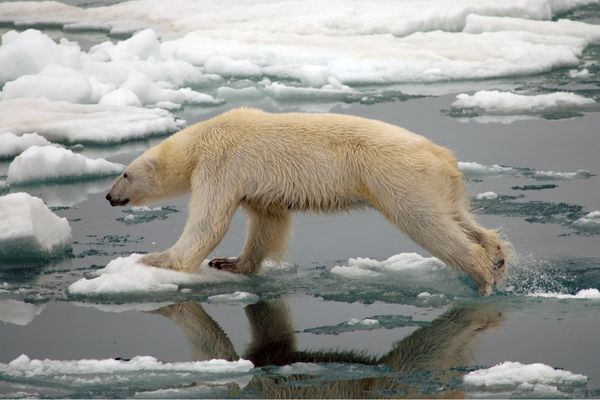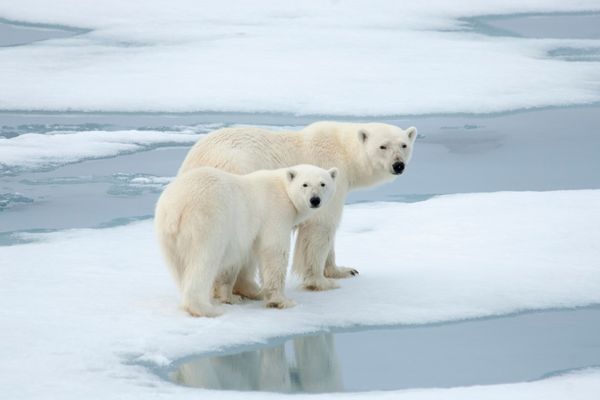Hibernation means passing the winter season in a state of dormancy or lethargy. Animals that undergo hibernation eat a lot when plentiful food is available in the summer season and store this excessive food in their bodies in the form of fats. Then in the winter season, when food is scarce, they hibernate and use their body fat reservoirs to survive. As most bears hibernate, you might think that Polar Bears might hibernate too. However, this is not the case, continue reading to know Do Polar Bears Hibernate or not.
Do Polar Bears Hibernate
So, do polar bears hibernate? The answer is “No”, polar bears do not hibernate. Unlike its closest relatives, the black and brown bears that hibernate in the winter to save energy when it is difficult to find food, the polar bear does not do so.
Why do polar bears not hibernate like their relatives?
The reason is their diet, polar bears eat seals as a major food item, which is available for them throughout the year. So they do not need to hibernate and save energy.
Scientists say that polar bears undergo a state of carnivore lethargy, but that is not hibernation in actual terms. Because in that state, their body temperature does not drop considerably and their other body functions also continue.
The pregnant female polar bears are exceptional. In late autumn, they dig the maternity dens in the snow where they spend winter. They give birth in the mid-winter and reside in the den until March or April to keep the cubs warm. Scientists say that they do not sleep continuously and their body temperature also does not decrease to the point as it does for other hibernating mammals.
When Do Polar Bears Hibernate
As mentioned above, polar bears do not hibernate like their other closest relatives (black and brown bears). However, the pregnant female polar bears hibernate and dig dens in the snow in the late autumn. Such dens are warm maternity dens that she enters in the late autumn (from about October to late November). In these dens, the pregnant female polar bears hibernate and give birth just like other bear species.
According to scientists, polar bears undergo a state of carnivore lethargy, but that is not hibernation. Because in that condition, their body temperature does not drop to a considerable point like hibernating black or brown bears and their other body functions also continue. It is sometimes called “walking hibernation”. They usually undergo such conditions in the summer season when food is scarce. They lower their heart rate, reduce their body temperature, and do not urinate or defecate to save energy. They continuously search for food and whenever they find and eat food, their bodies switch again to a normal state.
How Long Do Polar Bears Hibernate – Polar Bear Hibernation Period
All polar bears do not hibernate. Only the pregnant females hibernate. They dig dens in the snow where they hibernate from about October or November to March or April.
Do Polar Bears Hibernate In Winter
No, polar bears don’t hibernate in winter. Only pregnant females hibernate as she needs to stay warm in their late pregnancy. Hibernation is necessary for a pregnant female to conserve energy as her body would need higher energy than other animals while remaining active. She also needs a warm place to give birth and to keep the vulnerable cubs safe in the harsh polar climate.
Why Do Polar Bears Hibernate
Besides pregnant females, polar bears do not hibernate. The pregnant female hibernates to lower her energy needs because she has to spend about 5 months without food. The energy demands for an active and fasting polar bear are much higher, which would not be affordable for a pregnant female and that is why she hibernates in the winter.
She will also need a lot of energy to give birth to cubs and to produce fat-rich milk for them. The newborn cubs are extremely vulnerable. Because of the hibernation of their mother, they stay warm and secure in the harsh Arctic climate in winter.
Where Do Polar Bears Hibernate
As only the pregnant female polar bear hibernates, she digs a maternity den where she spends her hibernation period. The den is usually dug into a snowbank in the months of October or November. The temperatures inside the den are around 40 degrees warmer than the outside environment.
Do Male Polar Bears Hibernate
No, male polar bears do not hibernate. Only the pregnant females hibernate.
In case of food scarcity, all polar bears (males and females) have the ability to reduce their body temperature, lower their heart rate, and stop urination or defecation. They do so but not to a considerable point as hibernating bears do. They continuously search for prey and whenever they eat, their bodies come again to a normal state. It is sometimes called “active hibernation”.
In case of fasting and food scarcity, they also have the ability to actively use their body fat reservoirs just like hibernating bears.
Do Polar Bears Hibernate In The Summer
Polar bears do not hibernate in summer or winter.
Researchers say that polar bears have the ability to reduce their body temperature and lower their heart rate to conserve energy when food is scarce, usually in the summer.
However, it is not hibernation in actual terms because they continue their search for food and whenever they eat, their bodies come back to normal condition.
Do Polar Bears Hibernate Or Migrate
- All polar bears do not hibernate in the winter like their other relatives, the black and brown bears.
- However, the pregnant female polar bears hibernate to lower their energy needs and to stay safe and warm in the harsh winter.
- Polar bears migrate. They spend their winter season on the sea ice, where their prey (seals and other marine mammals) are found in abundance.
- In the summer season, they migrate toward the mainland or islands in the Arctic.
How Do Polar Bears Hibernate
Polar bears do not hibernate. Pregnant female polar bears are exceptional and hibernate in the same way as black or brown bears. Such females dig maternity dens in the late autumn, where they give birth and spend their whole winter there.
During this period, the females do not eat and drink and totally depend on their body fat reservoirs to survive. To prevent dehydration, their bodies biochemically recycle wastes (without the help of kidneys). They also do not urinate and defecate. They fast throughout the hibernation period and lose most of their stored body fats. They lose around 43% of their total body weight throughout the hibernation period.
Their heart rate drops from the normal resting heart rate of 46 beats per minute to about 27 beats per minute. During hibernation, their body temperature may also fall slightly, maybe to about 35 ℃ (95 ℉), or perhaps it remains at a normal level of 37 ℃ (98.6 ℉). The females give birth during hibernation. Their body fat reservoirs fulfill the need for high temperature and energy for pregnancy, birth, and nursing.
Researchers have found that in the case of food scarcity, non-hibernating polar bears (male or female) can efficiently use their body fat reservoirs much like the hibernating bears.
Polar Bear Hibernation Den
The hibernation den of the pregnant female polar bears is usually located on the snow banks, mostly on the slopes near the coasts with a face towards the south. The larger dens may have a height of three feet, a width of over eight feet, and an inside length of around ten feet.
The dens are composed of oval chambers and an entrance tunnel. The entrance tunnel linked the chambers with the outside environment. The dens may also have a hole for air.
As the snow has insulating qualities, the heat emitted by the hibernating bear may increase the temperature of the air inside the den to as much as 40 ℉, while even the temperature outside the den is far lower below the freezing point.
Do Polar Bears Give Birth While Hibernating
Yes, polar bears give birth while hibernating. As described above, only the pregnant female polar bears hibernate and they give birth to cubs during hibernation. The cubs are born in the month of December or January and stay inside the den with their mother until March or April.
Do Polar Bears Hibernate In Captivity
Polar bears do not hibernate in captivity. They even do not hibernate in the wild and only the pregnant females do.
Biologists say that other bear species will also not hibernate in captivity if food is available. Bears hibernate in the winter season to conserve energy when food is not plentiful. In captivity, they face no food scarcity and so do not need to hibernate. However, they will slow down in the winter and will sleep for a longer period than usual. In some zoos, bears are fed throughout the year and they do not hibernate.






Leave a Reply